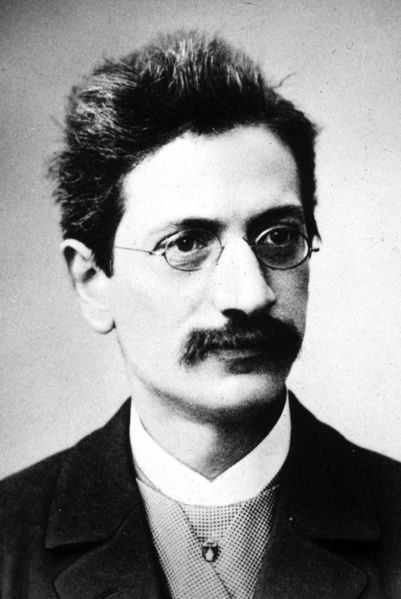<Back to Index>
- Mathematician Adolf Hurwitz, 1859
- Painter Julius Schnorr von Carolsfeld, 1794
- Minister of Justice Palmiro Togliatti, 1893
PAGE SPONSOR

Adolf Hurwitz (26 March 1859 - 18 November 1919) was a German mathematician, and was described by Jean-Pierre Serre as "one of the most important figures in mathematics in the second half of the nineteenth century".
He was born to a Jewish family in Hildesheim, former Kingdom of Hannover, now Lower Saxony, Germany, and died in Zürich, in Switzerland. Family records indicate that he had siblings and cousins, but their names have yet to be confirmed. His father, Salomon Hurwitz, was in the manufacturing business but was not particularly well off. Hurwitz's mother, Elise Wertheimer, died when he was only three years old. Hurwitz entered the Realgymnasium Andreanum in Hildesheim in 1868. He was taught mathematics there by Hermann Schubert. Schubert persuaded Hurwitz's father to allow him to go to university, and arranged for Hurwitz to study with Felix Klein at Munich. Salomon Hurwitz could not afford to send his son to University, but his friend, Mr Edwards, agreed to help out financially.
Hurwitz entered the University of Munich in 1877, aged 17. He spent one year there attending lectures by Klein, before spending the academic year 1877 - 1878 at the University of Berlin where he attended classes by Kummer, Weierstrass and Kronecker, after which he returned to Munich.
In October 1880, Felix Klein moved to the University of Leipzig. Hurwitz followed him there, and became a doctoral student under Klein's direction, finishing a dissertation on elliptic modular functions in 1881. Following two years at the University of Göttingen, in 1884 he was invited to become an Extraordinary Professor at the Albertus Universität in Königsberg; there he encountered the young David Hilbert and Hermann Minkowski, on whom he had a major influence. Following the departure of Frobenius, Hurwitz took a chair at the Eidgenössische Polytechnikum Zürich (today the ETH Zürich) in 1892 (having to turn down a position at Göttingen shortly after), and remained there for the rest of his life.
Throughout his time in Zürich, Hurwitz suffered from continual ill health, which had been originally caused when he contracted typhoid whilst a student in Munich. He suffered from severe migraines, and then in 1905, his kidneys became diseased and he had one removed. He was one of the early masters of the Riemann surface theory, and used it to prove many of the foundational results on algebraic curves; for instance Hurwitz's automorphisms theorem. This work anticipates a number of later theories, such as the general theory of algebraic correspondences, Hecke operators, and Lefschetz fixed-point theorem. He also had deep interests in number theory. He studied the maximal order theory (as it now would be) for the quaternions, defining the Hurwitz quaternions that are now named for him.
In 1884, whilst at Königsberg, Hurwitz met and married Ida Samuel, the daughter of a professor in the faculty of medicine. They had three children.